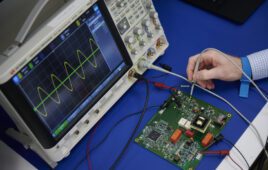
[Image from Pixabay]
In the medtech space, it seems as though every company is seeking ways to incorporate some form of AI into the digital features of their products and services.
So what is artificial intelligence good at when it comes to advancing medtech and healthcare in general? Here are seven recent examples:
1. Helping physicians quickly identify medical problems
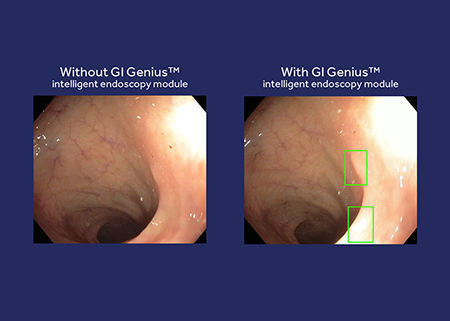
GI Genius’ AI-based enhancements place green boxes around areas that may need extra scrutiny during a colonoscopy, helping to prevent physicians from losing their focus. [Image courtesy of Medtronic]
For example, GI Genius is an AI-assisted colonoscopy tool designed to help detect polyps that may lead to colorectal cancer. Medtronic is the exclusive worldwide distributor of the technology, which was developed and manufactured by Cosmo Pharmaceuticals. Giovanni Di Napoli, president of the gastrointestinal business at Medtronic, showed some GI Genius footage at our DeviceTalks West event in Santa Clara, California, this past October. Historically, gastroenterologists detected fewer lesions while performing colonoscopies as their day progressed from morning through the afternoon. GI Genius’ AI-based enhancements help physicians stay focused by placing green boxes around areas that may need extra scrutiny during the diagnostic imaging procedure.
GI Genius could soon get even better. Medtronic has partnered with Nvidia to enhance the tool’s AI capabilities, allowing third-party developers to train and validate their AI models using the GI Genius AI Access platform. This technology has the potential to improve patient outcomes and reduce medical variability, while transforming the way healthcare approaches the early detection of colorectal cancer.
In other recent news, Viz.ai secured FDA clearance for its artificial intelligence-powered algorithm designed to detect and triage care for suspected abdominal aortic aneurysms (AAAs). Viz AAA automatically analyzes computed tomography angiography (CTA) scans for suspected AAAs. It alerts clinicians, displaying patient scans on their mobile devices for real-time communication among specialists. Jayme Strauss, chief clinical officer at Viz.ai, thinks Viz AAA will enable care teams to prevent aortic rupture and other catastrophic aortic emergencies by increasing surveillance. Viz.ai plans to continue expanding its healthcare offerings.
Meanwhile, HeartBeam recently secured a pivotal patent related to artificial intelligence capabilities for its AIMIGo system — a personal, portable vector electrocardiogram (VECG) system. HeartBeam is now partnering with Samsung to boost cardiac diagnostics.
2. Enabling better and more discreet health monitoring
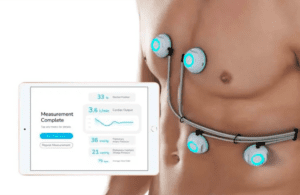
Sensydia’s AI-powered Cardiac Performance System (CPS) uses ultra-sensitive biosensors for the rapid, non-invasive measurement of a number of cardiac metrics. [Image courtesy of Sensydia]
The CPS uses ultra-sensitive biosensors for the rapid, non-invasive measurement of a number of cardiac metrics, such as ejection fraction, cardiac output, pulmonary artery pressure, and pulmonary capillary wedge pressure. Traditionally, patients need echocardiography and invasive catheterization to obtain these measurements, according to the company.
Sensydia announced in early May that it has raised an additional $8 million from an expanded syndicate of investors. The company plans to submit to the FDA in 2024 for prioritized review as part of the agency’s Breakthrough Devices Program.
Meanwhile, Boston-based Biofourmis has AI-driven software to collect and analyze patient data in real-time to identify shifts that require proactive interventions. It partnered with Japanese pharma giant Chugai to objectively measure pain in women with endometriosis. Their strategy is to use a biosensor and an AI-based algorithm utilizing Biofourmis’ Biovitals.
3. AI-enabled prosthetics

The Myo Plus system [Image courtesy of Ottobock]
For example, Ottobock has its Myo Plus pattern recognition system for trans-radial users. Myo Plus is meant to allow the system to adjust to natural movements versus requiring the user to adapt to the system.
4. Better visualization during surgery
Activ Surgical announced in January that it completed the first AI-enabled surgery using its ActivSight Intelligent Light product. Designed to provide enhanced visualization and real-time, on-demand surgical insights in the operating room, the ActivSight model attaches to laparoscopic and robotic systems and integrates with standard monitors. The first AI-enabled ActivSight surgery took place on Dec. 22, 2022, at the Ohio State University Wexner Medical Center. Dr. Matthew Kalady performed a laparoscopic left colectomy using the colorectal AI mode within ActivSight. The company says its goal is for every surgical imaging system to deliver intelligent information, reducing surgical complication rates.
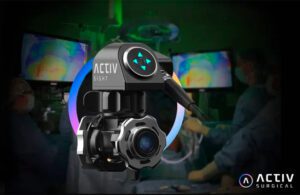
The Activ Sight system [Image courtesy of Activ Surgical]
5. Improved data collection from medical settings
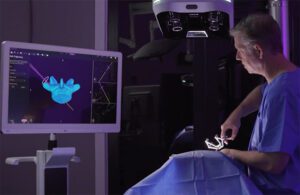
Proprio designed its Paradigm system to help surgeons better visualize spinal surgeries. [Photo courtesy of Proprio]
Proprio announced FDA clearance of the Paradigm system in late April.
6. Making better sense of patient data
GE HealthCare last year unveiled its Edison Digital Health Platform, an AI-powered, vendor-agnostic hosting and data aggregation platform. The medtech giant said the aim of the platform is to enable the easy deployment of clinical, workflow, analytics, and AI tools, connecting devices and other data sources into an aggregated clinical data layer. The open and published interfaces on Edison support the integration of healthcare providers and third-party developers’ applications into existing workflows. GE HealthCare had plans to integrate and deploy its own apps onto the platform. A company official said the goal was for clinicians to have actionable insights at their fingertips to help better serve their patients.
7. The ability to crack tough scientific problems — and enable countless innovations

DeepMind’s AlphaFold artificial intelligence predicted the structure of more than 200 million proteins. [Image courtesy of DeepMind]
This story originally ran on March 24, 2023. Updated on May 30, 2023.


